Canada, a country known for high quality of life, diverse cities, and stunning nature, has a lot to offer whether you are looking for a busy urban community with plenty of job opportunities, a family-friendly location with excellent schools, or a small town in a more rural landscape. If you are thinking of relocating within Canada or moving to Canada, it can be difficult to decide where to settle with so much choice.
Canada is one of the most diverse nations from its ancient Indigenous roots to modern day immigrants and this is reflected in its cities and towns, which have their unique lifestyle, climate and affordability level. In this article, we have gathered together the best places to live in Canada and explore what makes these locations such great places to call home.
How We Selected These Places
We looked at several factors when choosing the places to include on our list of best places to live in Canada in 2025. The key factors were:
- Opportunities to work with strong job markets and low unemployment rates;
- Cost of living, including buying or renting a property, groceries, and taxes;
- Quality of life, including access to healthcare and education, safety, and crime rates;
- Culture and entertainment, including restaurants, arts, festivals, and historical landmarks;
- Natural beauty and opportunities for outdoor activities
Best Places at a Glance
- Toronto, Ontario – Large, multicultural city with plenty of arts, culture, restaurants, and nightlife.
- Vancouver, British Columbia – A unique blend of natural beauty and urban living, catering for both culture and outdoor lovers.
- Calgary, Alberta – A friendly city close to the Rocky Mountains with a strong economy and many job opportunities, especially in the energy and oil sectors
- Ottawa, Ontario – Capital of Canada and a blend of modern amenities and cultural heritage with safe neighbourhoods and excellent schools.
- Montreal, Quebec – Bursting with European style charm, Montreal is an affordable city with a vibrant arts scene and great further education opportunities.
- Victoria, British Columbia – A city with historic architecture on Vancouver Island. It has a mild climate and a relaxed lifestyle.
- Halifax, Nova Scotia – A city with a growing economy and plenty of maritime heritage. It has affordable housing and plenty of opportunities for outdoor activities.
- Saskatoon, Saskatchewan – Often called the “Paris of the Prairies”, Saskatoon, an emerging city, is a great choice for people looking for a city with affordable living costs.
Toronto, Ontario

- What we like: This dynamic and multicultural city is full of career opportunities and cultural experiences.
- What to consider: Toronto has some of the most expensive properties and rents in Canada.
Toronto, the biggest city in Canada, is a dynamic metropolis renowned for its economic power, multiculturalism, and excellent facilities. Toronto, home to roughly 3 million people (or 6.4 million including the Greater Toronto Area), is Canada’s financial and business center, boasting excellent job opportunities in fields such as finance, technology, healthcare, and entertainment. Benefiting from its location on Lake Ontario, Toronto offers its residents a mix of urban energy and natural beauty, including parks, waterfront attractions, and recreational areas.
Residents of Toronto enjoy access to some of Canada’s best restaurants, museums, theaters, and events. The city is home to institutions such as the University of Toronto and world-class healthcare facilities. However, all this comes at a cost with Toronto’s property prices being among the highest in the country. People who are renting will also need to prepare for higher rents than in most other Canadian cities. However, for many people, the benefits of living in a city like Toronto outweigh the higher cost of living.
| Pros | Cons |
| Job opportunities | Cost of living |
| Excellent public transit systems | Heavy traffic |
| Multicultural city | Higher taxes than some other cities |
| Arts, culture, and restaurants | Climate; winters can be cold with a lot of snow |
| Excellent schools | Lot of competition for jobs in certain fields |
Vancouver, British Columbia
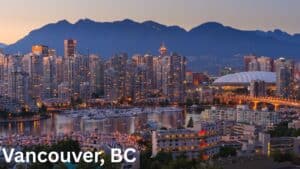
- What we like: Vancouver’s mild climate and stunning scenery are ideal for outdoor enthusiasts.
- What to consider: An expensive city, especially property prices, which interchangeably rank the highest in Canada with Toronto.
Vancouver, a city on the west coasts of British Columbia, is surrounded by mountains and the Pacific Ocean. The Vancouver Metro Area is home to just over 2.6 million people and offers its residents a high standard of living. With a strong economy, especially in trade, technology, film, and tourism sectors, Vancouver attracts professionals and entrepreneurs from around the world. The city benefits from a mild climate and offers plenty of choice for outdoor enthusiasts, from hiking, cycling, and kayaking, to skiing in nearby Whistler.
Like Toronto in the east, Vancouver is a multicultural city with many diverse neighbourhoods and a vibrant cultural and restaurant scene. Vancouverites have access to excellent healthcare and education, including top-ranking universities such as the University of Columbia. It also has an efficient public transport system, making it easy to live without a car. A downside of Vancouver is that it is a very expensive city, and its rents and property prices are consistently among the highest in the country. Despite the high cost of living, it is still one of the best places to live in Canada thanks to its clean environment, natural beauty, and overall high living standards.
| Pros | Cons |
| Mild climate | Winters can be rainy |
| Plenty of job opportunities | Very expensive to buy property |
| Stunning natural landscapes | Overall high cost of living |
| Great for a range of outdoor activities | Traffic can get congested |
| Excellent education facilities | Limited affordable housing |
Calgary, Alberta
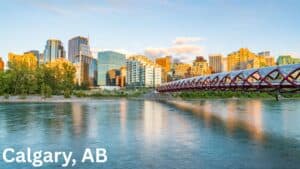
- What we like: Lower cost of living compared to other major cities in Canada.
- What to consider: Winters in Alberta are long and cold.
Calgary is located near the Rocky Mountains in southern Alberta. It has a population of just over 1.6 million in its metropolitan area and is one of the most prosperous cities in Canada, with a strong economy and one of the highest average incomes. Calgary also offers its residents lower-than-average taxes and affordable housing, which makes it an attractive choice for families and young professionals. The city has long been known as an energy hub, thanks to its strong links to Canada’s oil and gas industries, but it is diversifying its economy, especially in the technology, finance, and renewable energy fields.
Calgary benefits from its proximity to Banff National park, which offers easy access to world-class skiing and snowboarding facilities. It also offers plenty of opportunities for other outdoor recreational activities, including hiking and cycling. Calgary has high living standards, a clean environment, and low crime rates. However, because of its location, winters in Calgary can be harsh, with heavy snow and freezing temperatures. But anyone who is willing to endure long and cold winters, will find Calgary an affordable city with great opportunities for outdoor adventure and a strong job market.
| Pros | Cons |
| Strong economy with good job prospects | Long and cold winters |
| Affordable properties and lower cost of living | Many of the jobs are in the energy sector |
| No provincial sales tax | Public transit system is not as reliable as in other major cities |
| Lots of outdoor opportunities, including Banff National Park | Climate change is causing more wildfires in the province |
| Safe and family-friendly | Many of Calgary’s roads are in less than good condition |
Ottawa, Ontario
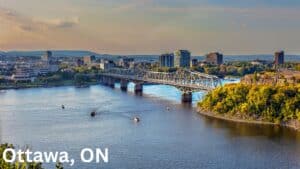
- What we like: A safe city with a steady job market, especially in the technology and governmental sectors.
- What to consider: Winters can be cold and it does not offer as much nightlife as, for example, Toronto or Montreal.
Ottawa is the capital city of Canada with a metro area population of 1.4 million. It is a cultural city that blends modern standards with its historical roots. Residents of Ottawa benefit from high standards of living, including excellent healthcare and one of Canada’s best education systems. Ottawa is the centre of Canada’s federal government and there are always job opportunities in this and other public sectors. There is also a growing technological industry, in particular in the Kanata region.
Ottawa consistently ranks as one of the safest and cleanest cities in Canada. It offers plenty of green spaces, cycling routes and access to other outdoor activities such as ice skating on the Rideau Canal during the winters. Although Ottawa has seen rising house prices, its property market is still significantly more affordable than many other locations in Ontario or across the country. One downside of Ottawa is, at least for those who enjoy going out to party, is its quieter nightlife. It can also have harsh winters with heavy snowfall. However, overall, Ottawa is one of the best places to live in Canada, thanks to its stable job market, affordability, and balanced lifestyle.
| Pros | Cons |
| Strong job market | Public transport not as efficient as in some other Canadian cities |
| Affordable housing market | Winters can be long and cold |
| Safe, clean, and family-friendly | Quieter nightlife |
| Plenty of space for outdoor activities | Less diverse entertainment scene |
| Bilingual environment | Other than property, living costs are higher than average |
Montreal, Quebec

- What we like: Montreal has a European feel, a vibrant cultural scene, and a relatively low cost of living.
- What to consider: Because French is the dominant language in Montreal, you may struggle with daily life and finding work if you do not speak the language.
Montreal is the largest city in Quebec and the Greater Montreal Area is home to over 4.3 million Canadians. The city offers a unique blend of old European charm and North American modernity, has a rich history, lively arts and restaurant scene, and diverse culture. Even though Montreal is the second largest city in Canada, it has a lower cost of living, especially when comparing house prices with the likes of Toronto and Vancouver.
With leading universities such as McGill and the Université de Montréal, Montreal is a significant educational hub and a centre for multiple industries, including aerospace, gaming, artificial intelligence, and film. Anyone considering moving to Montreal should know French is the primary language in the city and more often than not, you need to be proficient in the language to find employment. Overall, Montreal is a great place to live for anyone looking for a multicultural city with an affordable lifestyle and (and at least some) knowledge of French.
| Pros | Cons |
| Affordable cost of living | Long and cold winters |
| Plenty of culture and arts | French required for many jobs |
| Top universities | Public transit can be unreliable |
| Thriving restaurant and nightlife scene | High taxes |
| A unique European feel | Congested roads |
Victoria, British Columbia
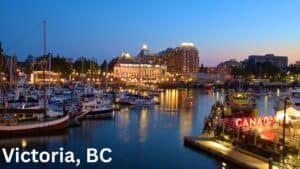
- What we like: Stunning coastal scenery, lively restaurant scene, and mild climate.
- What to consider: Property in Victoria is among the most expensive in the country.
Victoria is the capital of British Columbia and one of the smaller locations on our list, with just under 400,000 people living in the Victoria metropolitan area. Compared to the larger cities, Victoria has a slower-paced lifestyle, which makes it a popular choice among families and retirees. The climate is mild all-year round with less snow than most cities in Canada. Victoria has a beautiful waterfront, a vibrant arts scene, and historic architecture, which all contribute to its appeal.
People living in Victoria enjoy a high quality of life, and access to excellent healthcare and education. The city has a growing technology sector, but overall, job opportunities are more limited than in bigger cities. Anyone considering moving to Victoria should also consider the high property prices and cost of living before making the move. While the cost of living is high, Victoria has a lot to offer with the most restaurants per capita, plenty of surrounding nature, and a relaxed lifestyle.
| Pros | Cons |
| Mild climate | High property prices |
| Stunning nature | Limited job market |
| Friendly community | Island location impacts cost of travel |
| Lots of outdoor activities | Higher cost of goods |
| Safe and walkable city | Lots of competition for homes |
Halifax, Nova Scotia
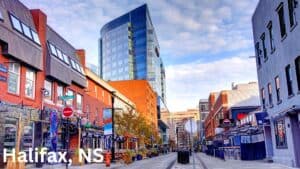
- What we like: Halifax has a growing economy combined with a lower cost of living.
- What to consider: Cold, snowy winters, and fewer job opportunities.
The capital of Nova Scotia, Halifax is a busy port city with maritime heritage, a lively cultural scene, and a friendly community. With a population of just under half a million, Halifax is Atlantic Canada’s largest city. While job opportunities in Halifax are less abundant than in the larger cities, it has growing healthcare and technology sectors. It also has a lower cost of living, especially when it comes to purchasing a home, which makes it an affordable choice for young professionals and families.
Halifax has a thriving arts and music scene, excellent schools, and its universities are gaining more presence. Because of its location, winters in Halifax are often very cold, with heavy snowfall. Its location also makes it more prone to storms than Canada’s more sheltered cities. Despite the cold winters and more limited job opportunities, the city’s welcoming atmosphere, beautiful nature, and lower living costs make it an attractive place to live.
| Pros | Cons |
| Lower cost of living | Cold winters with heavy snow |
| Growing technology and healthcare sectors | Limited job opportunities compared to big cities |
| Beautiful waterfront location | Higher cost of some goods |
| Great for outdoor activities | Limited public transportation outside the centre of the city |
| Strong community | Less entertainment options |
Saskatoon, Saskatchewan
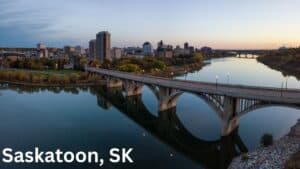
- What we like: An affordable city, with a growing economy.
- What to consider: Saskatoon has long and cold winters and a limited public transit system
Saskatoon is the largest city in Saskatchewan, with a population of just over 350,000. It is known for a strong sense of community and friendly atmosphere, and offers a more relaxed pace of life than larger cities. Saskatoon is home to the University of Saskatchewan, which drives innovation and research in the region. It also has a growing economy led by the agricultural, mining, and technology sectors.
Residents of Saskatoon benefit from a relatively low cost of living, especially house prices are considerably cheaper than in other major Canadian cities. The affordability of homes makes it a great choice for young families and retirees looking to downsize their expenses. Saskatoon offers its residents both plenty of opportunities for outdoor activities and an active cultural scene with music festivals, theatres, and art galleries. While downsides of the city include long and cold winters and limited public transit, Saskatoon is one of the best places to live in Canada thanks to affordable living, its community spirit, and access to nature.
| Pros | Cons |
| An affordable city | Winters are cold with heavy snow |
| Growing number of job opportunities | Limited public transit options |
| Great for outdoor activities | Smaller job market outside the area’s main industries |
| Family-friendly city | Less diversity than in bigger cities |
| Plenty of cultural activities | Travel to other cities can be expensive and time consuming |
If you are looking to move to another city or province in Canada, our top picks are great places to start your research. Of course, there are many other places in addition to the ones listed here. Therefore, it is important to thoroughly research your options and, if possible, visit your shortlisted locations before making a final decision.
Sources
Britannica –
https://www.britannica.com/topic/list-of-cities-and-towns-in-Canada-2038873
World Population Review – https://worldpopulationreview.com/cities/canada
Numbeo –
https://www.numbeo.com/cost-of-living/country_result.jsp?country=Canada
CREA – https://www.crea.ca/housing-market-stats/canadian-housing-market-stats/national-price-map/
WOWA – https://wowa.ca/reports/canada-housing-market
Toronto – https://www.toronto.ca/
Vancouver – https://vancouver.ca/
Calgary – https://www.calgary.ca/home.html
Montreal – https://montreal.ca/en/
Victoria – https://www.victoria.ca/
Saskatoon – https://www.saskatoon.ca/
Halifax – https://www.halifax.ca/
Ottawa – https://www.ottawa.ca/en